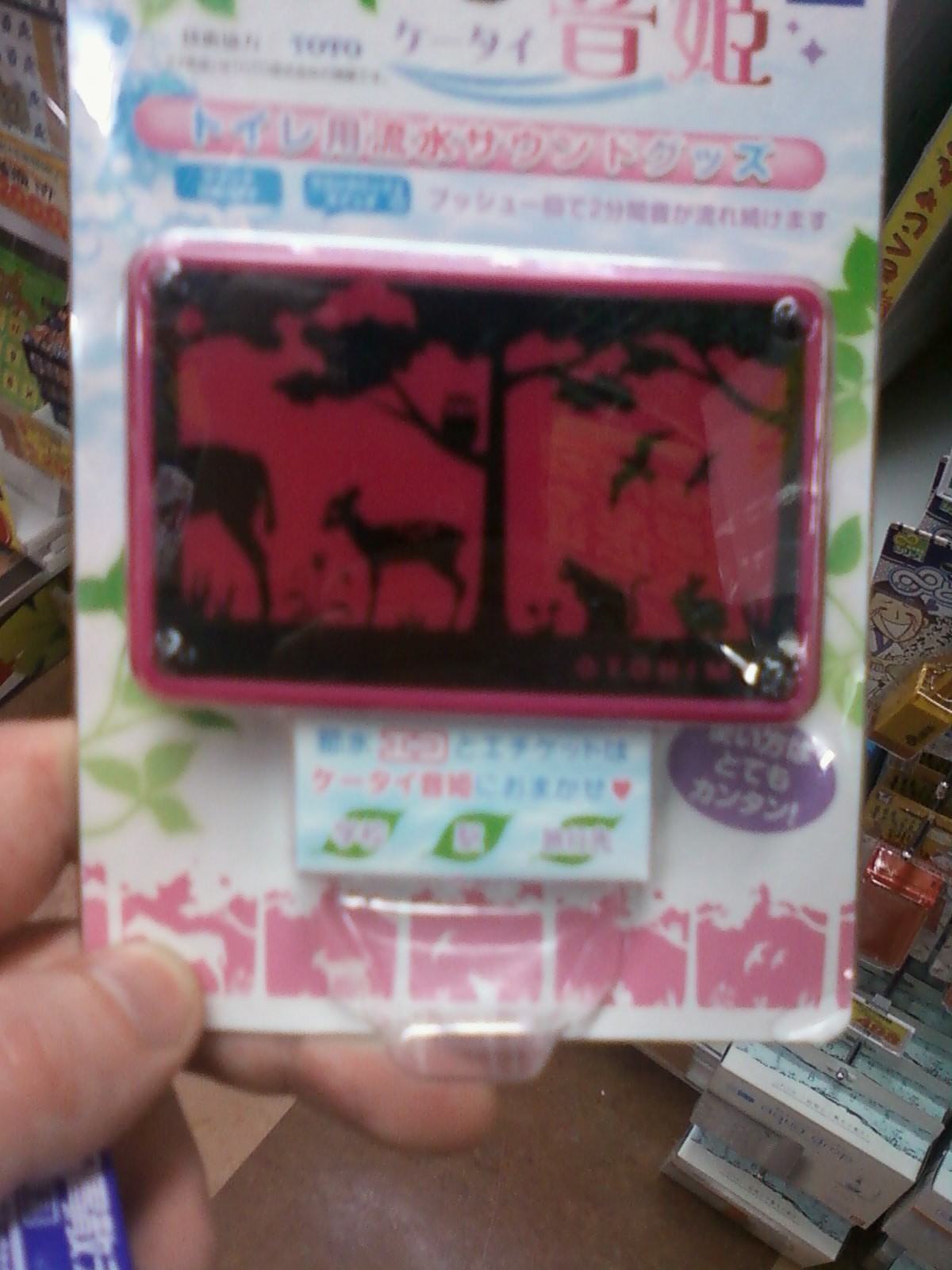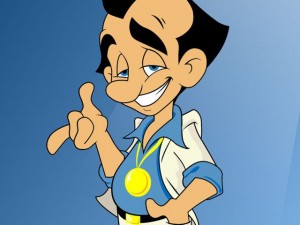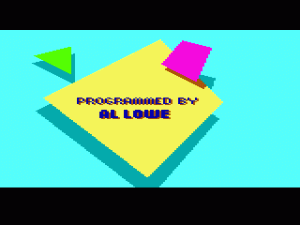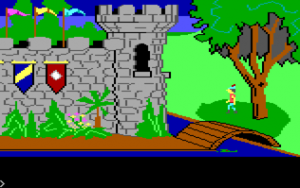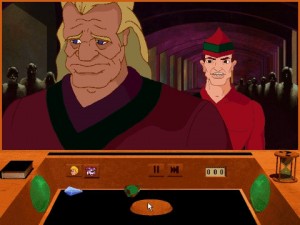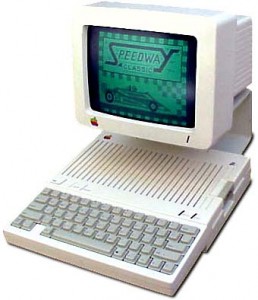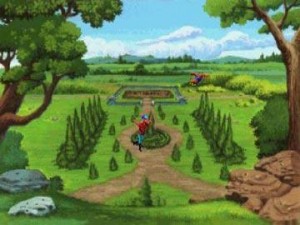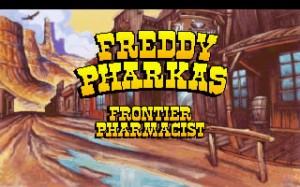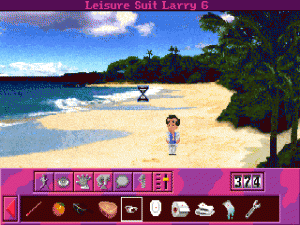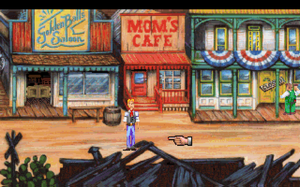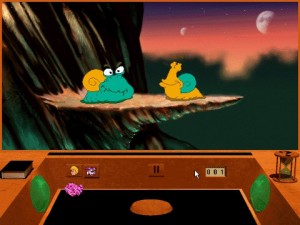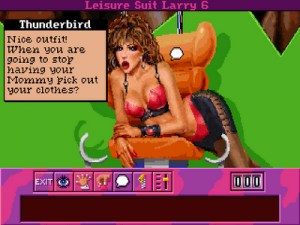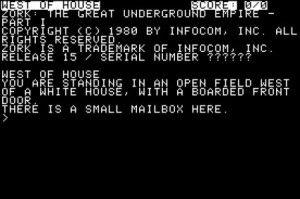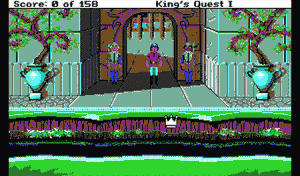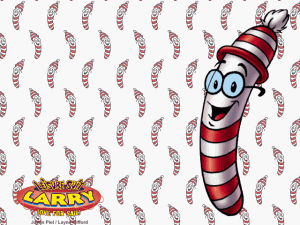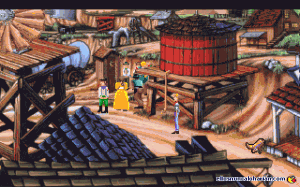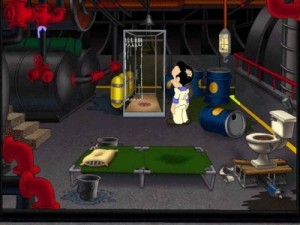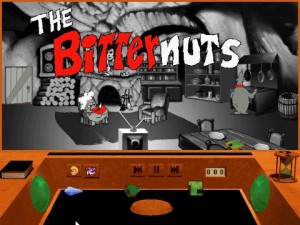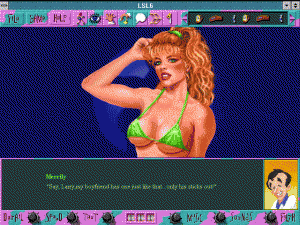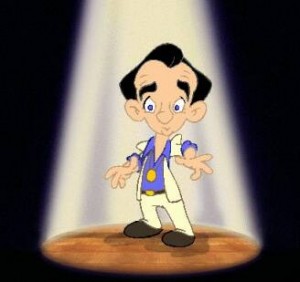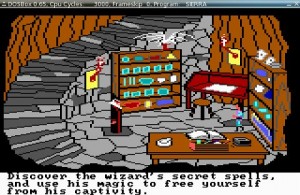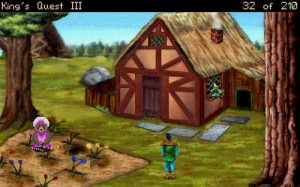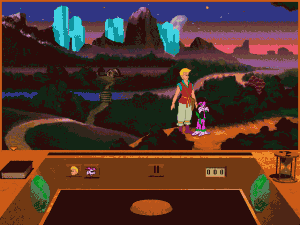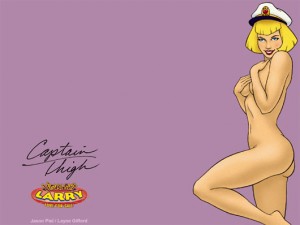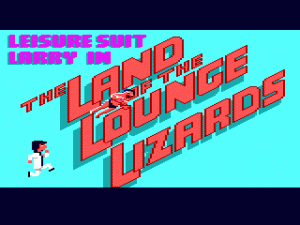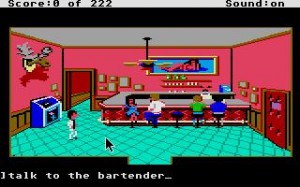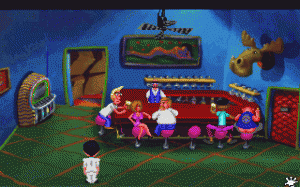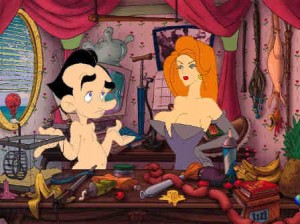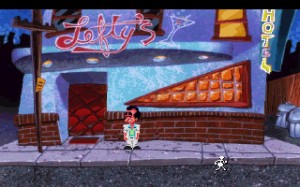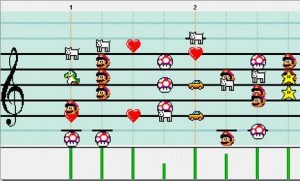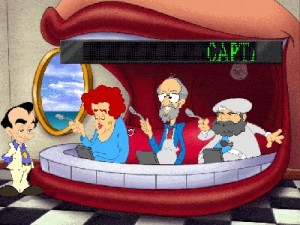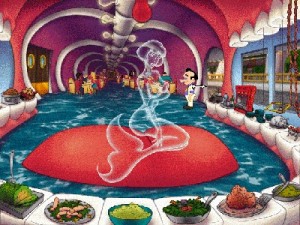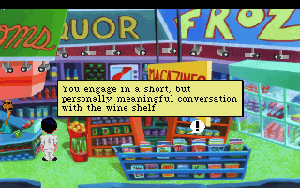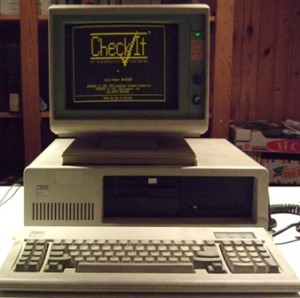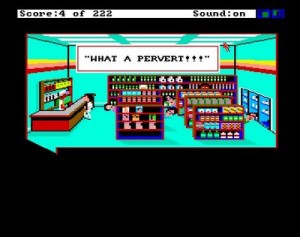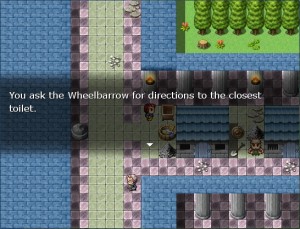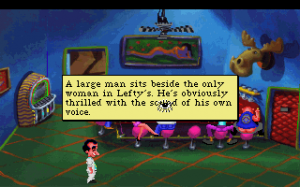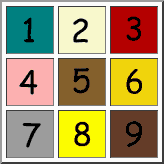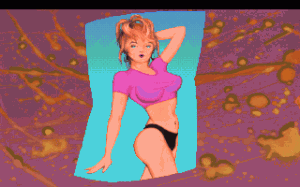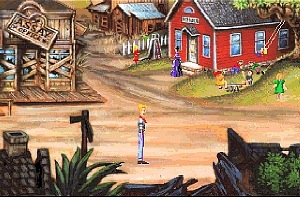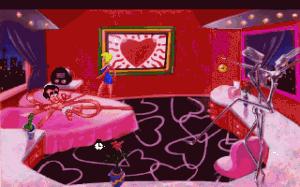I just had the amazing chance to interview an absolute legend in game design, story writing, humor, coding, music, audio… everything! Mr. Al Lowe.
Yes, that Al Lowe.
If you’re not familiar with him, Al Lowe was the designer and writer for the Leisure Suit Larry series, Freddy Pharkas, and Torin’s Passage games. In addition, Al Lowe also worked on most of the King’s Quest and Police Quest games.
As I said, he’s a legend in the field and one of my personal heroes. So I’m ecstatic to speak with him!
To hear the full, hour-long interview Podcast (do they still call them that?) with Al Lowe (in super-high quality!), download the file: here
I really enjoyed picking Al’s brain and listening to his stories about Game Development. Topics range from programming on every platform possible, writing and recording music, holiday barbecues (with hot sauce!), Casual Games, Monkey Island, First Person Shooters, and talking wine-shelves! And that’s a small sampling 😉
Below is the full transcript of the interview (complete with notes, links, pics of scantily clad women, and explanations):
Al Lowe: Jason, it’s Al Lowe!
Jason Surguine: Hello, Al Lowe!
Al Lowe: How are you?
Jason Surguine: Excellent. Good evening (good afternoon?)
Al Lowe: This is an amazing technology! Isn’t it?
Jason Surguine: This… internet stuff is crazy!
Al Lowe: It’s Crazy!
Jason Surguine: So, first of all, thank you for allowing me to ask you (too many) questions. I’m truly humbled by your presence.
Al Lowe: (laughs) Well, my wife tells me that we’re going to have dinner about 6. So, we only have 1 hour.
Jason Surguine: Only one hour! I’ll make it quick!
Al Lowe: Okay.
Jason Surguine: First, let’s plug your humor site: www.allowe.com and the CyberJoke 3000.
Al Lowe: I’ve heard of those!
Jason Surguine: So everyone can go there, laugh at something funny, and then come back to this really exciting interview.
Al Lowe: Yeah! My guarantee is that it’s worth the price they pay, or double their money back!
Jason Surguine: (laughs) it’s… Free, I’m pretty sure…
Al Lowe: Oh yeah! That’s how it works!
Jason Surguine: Let’s do a little bit of intro and talk about your life before your brave expedition into becoming a game designer for Sierra Online.
Al Lowe: Sure.
Jason Surguine: You majored in Music at University. Correct?
Al Lowe: I did.
Jason Surguine: And Saxophone was your major instrument?
Al Lowe: Yes.
Jason Surguine: And you can’t make money in the real world by playing music, right?
Al Lowe: (laughs) Well, some… few people here and there can. I cannot. So… (laughs)
No, my goal when I went to college, I thought I wanted to be a professional musician. But, I quickly saw reality and decided that I wanted to teach.
I’d always been interested in teaching. In fact, I had been president of the future teachers club when I was in high school. So I always thought teaching was a good career for me. It was always in the back of my mind.
Then when I realized ‘Yeah, you might make it in music, but you’ll probably just starve.’ Then teaching was the obvious thing.
So I went on to become a High School Band Director and did that for 10 years, then became a school administrator in music. I was in charge of all the instrumental music in a large suburban school district in California.
I did that for 5 years and I looked around one day and I was at the top of the salary schedule, and I had another 20 years to go before even early retirement!
And it was like, ‘Wait a minute! Am I gonna do this the rest of my life?’
Well, at about that time, I had gotten interested in computers, that was when the Apple II first came out. And the school had gotten a few, I mean literally a few like 3, I think, in the whole district. Apple II, this is before the Apple II + even. I mean, this is way back in the early days.
Jason Surguine: Before the [Apple] II C. That’s the first one I picked up.
Al Lowe: Oh, long before the II C. That was very, very modern. (laughs)
So, I grabbed one of those machines and took it home one Easter Vacation and started playing around with it and… Actually, I became a hacker in the old sense of the word. As opposed to a cracker or, you know, a vile, obscene, kind of nasty person who does things.
In the old days, a hacker was a complimentary term. It was a guy who kind of worked on his out clever things…
Jason Surguine: Put things together all on his own. You figured it out.
Al Lowe: Yeah! But the bad guys have kind of taken over that term now. So, I hesitate to say that I was a hacker. But that’s what I did. I sat at home, farted around with this machine and just made it do cool things and…
Jason Surguine: You improvised!
Al Lowe: I did!
Jason Surguine: You were a Jazz Programmer!
Al Lowe: You know, I didn’t think of it that way at the time, but that’s exactly right! Taking it through my whole career, those themes keep re-occurring that I have this combination left-side/right-side brain. That I have a certain amount of logic and organization skills. But then I have this creative side. I’m not ultra-creative like a lot of the artists that we used to hire at Sierra who, couldn’t back up a floppy disk if they had to…
Jason Surguine: (laughs)
Al Lowe: …Because they would just assume… Well, I remember one time, a guy had worked for hours on this one graphic.
So I said, ‘Well, how many versions of this have you saved?’
He said, ‘I haven’t saved any yet, it’s not finished!’
Jason Surguine: Oh god…
Al Lowe: (laughs) So I’m not that side of the creativity part. On the other hand, I was more creative than most of the Math Majors and stuff that turned out to be programmers back then.
Jason Surguine: So you were able to take a logical approach to both sides of the brain.
Al Lowe: Yeah, I guess so. I had that kind of split-thing going, I guess. Where I’m not good at either one, so I’m pretty good at both so I can get by. I guess, I don’t know (laughs)
Jason Surguine: You’re a ‘Jack of All Trades’ or ‘Renaissance Man’ that’s what it’s called.
Al Lowe: Well, you know, in a certain sense I guess that’s true. Because I thought that I was late getting into programming. I remember thinking ‘God, I don’t have the math background, I don’t have a lot of college courses in programming…’ And of course, back then, I don’t even know that there were…
Jason Surguine: You Majored in Music, you can count to Four!
Al Lowe: Exactly! Well, hey we were doing 7/8 [time signature] (an odd-metered tempo used mostly in Jazz, Classical and Prog Rock.) so yeah, there you go!
Jason Surguine: That’s right, Jazz. Of course.
Al Lowe: So it was an interesting combination, I guess.
Jason Surguine: Not to draw any weird parallels, but I majored as a sax player as well in University…
Al Lowe: Oh no! Is that right?
Jason Surguine: (laughs) Yeah. Completely by accident, I uh… wasn’t following you and saying, ‘Okay, and now I’m gonna teach High School band!’
Al Lowe: (laughs) Later on, we’ll trade serial numbers.
Jason Surguine: Actually, I find it really interesting that you started out your job as sort of a lone wolf. Where you did all of the programming, writing, graphics, sound, music, and even the package design (in some cases)!
Al Lowe: Well, that’s what everybody did back then. That’s how… We didn’t know what to do!
You know, it’s funny because I talk to people now, and they say, ‘What career path did you follow?’ Hell, we didn’t even have a path! There was no path! We were kinda hacking our way through jungle.
Jason Surguine: You blazed the path.
Al Lowe: Yeah, we didn’t know what we were doing. And a lot of the code…
They’ll say, ‘Well, why did you code this way?’
And I would respond, ‘Because I didn’t know what I was doing!’
Jason Surguine: Because it worked!
Al Lowe: I didn’t know what to do!
Jason Surguine: But as you progressed and became better, you ended up doing less and less… and near the end, you mostly came up with writing the humor, story, and overseeing the design.
Al Lowe: You know, that’s an amazing aspect about software. The better you get at it, the less work you do.
The last few games, I only did the design. Well, I shouldn’t say only the design. I did the design and the writing. So I was the creator, the screenwriter. I also was the director, because I was in charge of the look and feel of the game. So I had day-to-day oversight of the guys who were producing the graphics and sounds and so forth.
So I guess in the film world, I would’ve been a screenwriter/director. In the early days, I was also the producer. But fortunately, towards the end I got to get away from that. I didn’t have to deal with the spreadsheets and the dollars anymore.
Jason Surguine: So you’ve used everything from coding in assembly on the Apple II, to state-of-the art, proprietary design software for Larry 7.
Al Lowe: Exactly.
Jason Surguine: I can only imagine that using the top-of-the-line stuff is a lot easier to use.
Al Lowe: Well, it is easier to use. But more than being easy, what it did was enable us to do more. Because we developed that engine and it was really good at that limited subset of the things that we did.
We got really good at being able to do games in that style. The same way that everybody that buys the Quake Engine today ends up… it’s pretty easy to turn out a game that looks like Quake. It’s really hard to turn out a game that doesn’t look like Quake!
We did some of that. We did some games that didn’t look at all like an adventure game. But eventually, that language became sort of a mixed blessing, in that it was -besides being easy- it was also easy to slip into those handcuffs.
Jason Surguine: Right.
Al Lowe: So, therefore a lot of the Sierra games ended up looking a lot like the other Sierra games.
Jason Surguine: Pretty similar.
Al Lowe: Yeah!
Jason Surguine: I think Torin’s Passage actually looked a bit different though. The style of the thing…
Al Lowe: Well, that was a great deal due to the art style. The art director on that, a guy named Jim Murphy, who left me -I’m proud to say-, went straight to Pixar, and has had real big success at Pixar. Every time I see one of the Pixar movies, his name is higher up in the credits. He’s doing great stuff there.
But, I owe a lot of that to Jim, because he really had a true vision for making that game unique.
Jason Surguine: In that vein, what do you think of easily accessible, affordable game engines, which focus less on coding, and more on design and scripting. Such as (I don’t know if you’re familiar with) Torque or Unity, you know Garage Games…
Al Lowe: Oh sure! Well, Torque came from the Dynamix guys, which was part of Sierra. So, sure I know all those guys. But yeah…
I’m all in favor of people using the best tools available. And I follow that through in my woodworking and my other kinds of activities too. I’m a big believer in building tools.
To the extent that, that was a lot of my time spent developing software. I built the tool that Sierra used, everybody at Sierra used, to develop games for many years. Simply because I was real lazy! I got tired!
Jason Surguine: (laughs) You didn’t want to keep doing the same things.
Al Lowe: Doing the same thing over and over again. So what I did, was I built a small game (a game that would fit on a floppy) and it had almost no resources but it enabled you to load any resources. So…
Excuse me a second, I gotta cough.
(silence)
Al Lowe: Did you hear that?
Jason Surguine: I didn’t hear that.
Al Lowe: Oh good! My button works! I have a cough button!
Jason Surguine: (laughs) A cough button!
Al Lowe: Yeah, so I built this tool and I called it, ‘Tester’, I think.
Jason Surguine: That would be the creative name.
Al Lowe: And you would be able to move animations around and position them on the screen and so forth. All on the fly! You could do that in a game environment, and it made it much faster. It got to the point where you could even save code snippets and things and then just paste them right into the game. It really sped up game development a lot.
It was funny, it just literally started out because I got sick and tired of doing the same thing over and over again and…
Jason Surguine: Plotting the X and Y for each graphic.
Al Lowe: Well, that among a thousand other things. Plotting the path that the characters would follow and the interaction between different graphics and where the lines of (we used to call it priority), but it’s called planes, I think, today. In today’s language…
You know it’s funny, we invented our own vocabulary, most of which never caught on with anybody else. Because, it wasn’t very logical. But it was the terms that we used.
Jason Surguine: That you came up with, so…
Al Lowe: Yeah, I mean, at some point somebody called animations, ‘views’.
Jason Surguine: Views?
Al Lowe: Because you could change a character’s view and he would look different.
Jason Surguine: True.
Al Lowe: Yeah! And so, rather than saying, ‘Oh, we’ve developed these 10 different animations for the protagonist,’ instead we called it ’10 different views.’
So, if you look through Sierra’s old code, you’ll see references to views and to files, we named the files ‘v16’ for 16 color views and ‘v56’ for 256 color views. Yeah, we should have been calling them animations all along.
(laughs)
Our backgrounds, I think we called ‘pics’.
Jason Surguine: Pics.
Al Lowe: Yeah, pics.
Jason Surguine: Which is now short for pictures.
Al Lowe: Yeah, and what was the other thing?
Oh, and instead of calling it a ‘scene’, we called it a ‘room’. Because in the early games, they were kinda room-based. So, it was like, ‘Well, I think I’ll go from room 12 to room 13.’
Jason Surguine: I think that dates all the way back to Zork.
Al Lowe: Yeah, exactly! And of course, they should have been called ‘scenes’. Probably.
Jason Surguine: Yeah. Probably.
Al Lowe: But, what did we know?
Jason Surguine: (laughs) Well, I’ve read a lot of the game design documents you have listed on your website, on www.allowe.com , and they’re actually really impressive.
Al Lowe: And they’re well worth the price!
Jason Surguine: They’re absolutely worth the price!
Al Lowe: (snickers)
Jason Surguine: You can basically plug everything into the game engine with, little programming or scripting required. I’m just curious, were they originally that complete? Or did the original design documents have closer to outlines, which dynamically changed during the development process?
Al Lowe: I would say that the majority of the ones that are posted there are within 10% of where they were before we got the team started.
Jason Surguine: Wow, that’s amazing!
Al Lowe: I would get them that far along. It came about because, when I would do the game myself, I would plan things out. You know, when I was working alone. So it was normal to me to just kinda plan everything out.
Yeah, my problem was that I would try and take too much control. I would get mad when they wouldn’t follow my numbering.
Jason Surguine: (laughs)
Al Lowe: I would say they were probably 90% complete, and then the other 10% we would add during the course of development as guys came up with good ideas.
So, a lot of the funniest stuff that’s in the games were actually things that would come up during the course of development. For example, we had a standing rule that if, at one of the team meetings, you proposed something and it got a big laugh around the table…
Jason Surguine: You gotta add it to the game.
Al Lowe: Yeah! You gotta add it! So, in Larry 7, the ‘Where’s Dildo?’
Jason Surguine: (big, just remembered, nostalgic laughter)
Al Lowe: One of the animators was drawing, cartooning, during the meeting cause, that was what all artists do (doodle) during meetings. There was no way to stop them, so we didn’t. We didn’t even discourage it.
Jason Surguine: That’s the artist’s way of taking notes.
Al Lowe: Exactly. Anyway, he drew this salami-shaped, ‘Where’s Waldo?’ character and people started laughing at it. So, the more we brainstormed it… we kinda held it until the last minute. And when the game went into QA to test for bugs, there weren’t many bugs. So the programmers and the artists were kinda bored. So every time they didn’t have something to do, they would implement another one of the dildo locations.
Jason Surguine: That actually turned into one of the best side-quest things for the game.
Al Lowe: I know! It was great! (laughs)
Jason Surguine: Every time you found a new one, it would play the, uh little conga music.
Al Lowe: Yeah, and the producer of the game came up with that song and he did that voiceover track.
We used to go out for barbecue to this place where the proprietor would walk around carrying a pot of liquid battery acid, which he called ‘hot sauce’ (laughs)
He would give you a toothpick, he would dip a toothpick in this little quart saucepan that he had and, touch the toothpick to your tongue… and you would just cry out in anguish! I mean, it was nothing but pure capsicum. Whenever somebody would taste it, he would go, ‘Yeah baby!’ And we all thought that was a crackup and so…
Jason Surguine: It’s gotta go in!
Al Lowe: Yeah, we included that and one of the animators could do a perfect impression of him. So, he did the ‘Yeah baby!’ and Mark [Seibert] did the ‘Oh boy…’ voice or whatever that voice was and the music. Yeah, totally a great example of team involvement.
Jason Surguine: So do you play any games today?
Al Lowe: You know, I play the hell out of Bejeweled 2 for some reason. I got hooked on it on my iPod and I play that more than I play anything else.
Jason Surguine: I think that’s the majority of the world.
Al Lowe: I tend to look at modern games and I keep waiting for a game that would make me laugh. I’m looking for a Ron Gilbert [Monkey Island] or a Tim Schafer [Day of the Tentacle, Psychonauts], a Scott Murphy [Space Quest]. You know, some of the people that used to do funny games and they’re not out there. So I tend to be disappointed by that.
But I’m glad to see Sam & Max is doing well. At least, my belief is that they’re doing well (I don’t really know).
Jason Surguine: I’m getting to that… (laughs) Ron Gilbert is working on something called Deathspank.
Al Lowe: (laughter) Yeah, I’ve heard that! I love the title!
Jason Surguine: So, we’ll see. Tim Schafer just released I can’t remember the name of the game [Brutal Legend], but it got mixed reviews, so I’m not going to touch it.
Al Lowe: Well, as did Psychonauts.
Jason Surguine: Psychonauts was brilliant though.
Al Lowe: I thought it was a great game, but it sold terribly.
Jason Surguine: So favorite genres would then be: Casual Games like Bejeweled 2 and Funny Games.
Al Lowe: Well, favorite genre would be Comedy Adventure games. But, where are you going to find one of those?
Jason Surguine: Well, I know you’ve been asked previously about Tell Tale games, but I found it really interesting that Lucasarts recently licensed the Monkey Island rights to Tell Tale to continue the Monkey Island graphic adventures.
I’m happy and I’m a bit shocked at Tell Tale’s success, what’s your take on that?
Al Lowe: You know, if it works, I’m proud and pleased for them. I just hope it works.
Jason Surguine: I can only imagine because of Sam & Max’s success that Lucasarts saw the opportunity, and it might have been because of Monkey Island’s 20th anniversary or something, but…
Al Lowe: Yeah.
Jason Surguine: They re-released the original Monkey Island and they redid all the graphics for it.
Al Lowe: Yeah! I love that! And they left in the old graphics so you can see the difference.
Jason Surguine: Yes, that was very cool. Then they decided to continue the series with Tell Tale, so they licensed it out. So, I can only imagine it’s doing well. I honestly haven’t played them yet.
Al Lowe: I haven’t either.
Jason Surguine: But I’m getting to it, eventually. What do you think of the episodic format in general?
Al Lowe: I love the concept, but I noticed that I downloaded the first few and then I didn’t get back to do anymore. And, that’s not a good sign. I hope that I’m the exception and not the rule.
If it works, I think it’s a great idea. I’m just afraid that more people are gonna do what I did than continue on. Because, boy, there’re a lot of demand for people’s money and time today.
It’s not like it was in the eighties. When we would release a title, there was this incredible pent-up demand, and people would just rush to the store and buy these games. Plus, they would stay on the shelves [the games] forever. You used to go into Best Buy… or back then, Radio Shack, or Software Etc. or, you know, a lot of those egg-head…
Jason Surguine: Software Etc? What else was it… Babbages?
Al Lowe: Yeah! Remember all these old places that you would go and you’d walk in and say, ‘Hey, what’s new?’ and they would say, ‘Oh there’s this new Larry game, you should see it! Blah blah blah,’ and now, what do you do?
You have to get through all the online clutter and find somehow to convince people that they should download the next episode. It’s a much tougher business today than it was back then.
Jason Surguine: Back then, you were also able to… Larry would take at least a year to develop.
Al Lowe: You mean to sell?
Jason Surguine: Before it would be released. I mean, you never released more than one Larry game within one year. Uh, I think I’m right?
Al Lowe: Right, yeah. When games started out, it would take… Oh gosh, I think I was working full-time and I developed two games in three months in my spare time. That was when I started in ’82. So games were much smaller and quicker. And they were much more like casual games are today.
Jason Surguine: Right.
Al Lowe: But along the way, games kept getting bigger, longer, and more involved and more labor was demanded to produce them.
Jason Surguine: More expensive.
Al Lowe: Until, we got down to the point of scheduling one a year and then, busting our hump just to get that out.
I remember finishing Larry 6 and starting Larry 7. It was tight. I think I went on vacation and I took notes during vacation of things that I could try. Then I got back and I immediately dove in before Christmas, started the design, and we had the design pretty much done by January. And we shipped on Halloween. So that was a quick turnaround back then.
Jason Surguine: I think the episoad-ick, episawd-ick? I still don’t know how to pronounce that.
Al Lowe: I think sod?
Jason Surguine: Ah, it’s sod.
Al Lowe: (laughs)
Jason Surguine: It’s episode, but it’s episodic.
I think their answer is to try to still have really good graphics [and design/music/production] and if they release it in smaller segments, then it’s cheaper to produce. Instead of waiting an entire year and building up a huge game, they’re just releasing it in segments.
Al Lowe: I like the idea. I like the concept. And I hope that they’re successful.
For selfish reasons! I’d like to play funny game again! You know?
Jason Surguine: Okay! Alright, then I have to ask: If the rare chance ever came up where, somehow magically, Tell Tale attained the rights to make an episodic Leisure Suit Larry graphic adventure series, would you be willing to work with them on it?
Al Lowe: Oh… sure! Yeah! Not a problem. But the problem today is that the Larry franchise has been so…
Jason Surguine: Destroyed?
Al Lowe: Well, I was gonna say ‘stained.’ (laughs)
Jason Surguine: Oh, sorry. (laughs) I don’t even consider the last two. They’re not even real Larry games.
Al Lowe: Right! But I think that… You know, it’s been 10 years since we’ve done a real one. And I’m afraid that in gaming lifetime, that’s like two generations or something. So, I don’t know that anybody would even know there was a Larry that didn’t suck. (laughs)
Jason Surguine: Then again, there was Monkey Island 4. Sorry.
Al Lowe: Well…
Jason Surguine: I don’t know if you played Monkey Island 4.
Al Lowe: I did… I played awhile.
Jason Surguine: It was painful.
Al Lowe: Yeah.
Jason Surguine: And Monkey Island 3 [which was fantastic!]… That’s about 10 years as well.
So, we’ll see.
Al Lowe: The difference is, that you’ve gotta be able to control your cost. Because if you’re trying to do a 20 million dollar game, you’re going to fail. There’s not that kind of sales in an adventure game (or in comedy games). But if you can do a 2 million dollar game, well yeah you can probably make that money back.
Jason Surguine: Sure. You’ve often mentioned how Ken Williams (the co-founder and big boss of Sierra) was always looking for games to market where no market existed. Which I think is how games like Leisure Suit Larry and Police Quest came about.
Al Lowe: Yeah! I mean, his philosophy was always: ‘Hit ’em where they ain’t!’ And that was a great, short description of what he did. He would go into video stores and look at the shelves ad say ‘How come there’s no Romantic Comedies?’ We’d all look at him and go, ‘I don’t know how to do it! How would you do that?!’
Jason Surguine: A Romantic Comedy Game?
Al Lowe: Exactly! ‘Ahhh! Not me Ken! I can’t do that!’
But I did do a Western!
Jason Surguine: That’s true. A Western Pharmacist.
Al Lowe: A Comedy Western!
Well, Pharmacist because I got tongue-tied when we were talking. I started to say farmer and rancher at the same time, and ended up saying like, ‘Farmersars’!
Jason Surguine: Farmacerz? (laughs)
Al Lowe: Or something, and I finally said ‘Hey! He could be a Pharmacist! That would be funny!’
Jason Surguine: I was actually reminded a lot of Blazing Saddles when I played that game.
Al Lowe: Well god bless you because that is one of my favorite movies and a real inspiration for it. I watched Blazing Saddles a LOT before that game! While I tried not to rip it off directly…
Jason Surguine: There was definitely inspiration there.
Al Lowe: Oh, are you kidding? That movie is still one of my all-time favorites!
Jason Surguine: Do you think that games in general are doing what Ken [Williams] did back then?
Al Lowe: No. I think they’re doing the opposite.
I think that today’s publishers are not nearly as visionary as the guys were back then. Today, it’s much more of a market-driven sort of game design. In other words, they look at the marketplace and they see what’s selling, then they go to the game designers and say ‘Make me something that’s a lot like this, only a little bit different.’
Jason Surguine: ‘And that way we can still make money’
Al Lowe: The way they plan their budgets, is to see what sales were on a game that was like yours. Then, if yours is going to be better, they’ll say, ‘Well, maybe you’ll sell the same or a little more.’
But if they think, ‘Maybe you’ll be like that one, but you won’t be as good as that one’, you don’t have time to be as innovative, or as large, or as expanding, or groundbreaking, or whatever: Then they’ll give you a a lower budget because of that.
And so, the money that you get to develop the game is almost strictly dependent upon the type of sales that a similar game has sold previously. Boy, that’s just a recipe for not getting…
Jason Surguine: For no innovation.
Al Lowe: How not to get creativity.
Jason Surguine: How about the Independent or Casual Gaming markets?
Al Lowe: Well I think the Independent Publishers are having a rough go of it today, but I think the Casual Game market is much similar to the way the general gaming market was back in the eighties and nineties.
Because, the Casual Gamers [developers] can afford to spend two or three months, whip out a game with one programmer and an artist (or maybe two programmers and two artists) and they can throw it out and see if it’s a hit. And, if once in awhile you get a big hit, that’s great. But mostly, if you just get your money back and you make a little bit more, well then you get enough… you get to Play Again!
I mean, that was always the way we did it. If your game sucked, you might not get the chance to do another one. but if your game was good, and it sold well, then you get to do another game. And that was kind of the measure of success that we had.
‘If I can do a good job with this one, maybe I’ll get to do another one!’
And that was really the goal that we set for ourselves.
Jason Surguine: So the goal was to make enough money to make another one, to make enough money.
Al Lowe: Exactly! Yup!
Jason Surguine: By chance, do you have an iPhone?
Al Lowe: I have an iPod touch.
Jason Surguine: Do you play games on it?
Al Lowe: I do, some.
Jason Surguine: Bejeweled probably.
Al Lowe: I do, but I’ve got a few other things, I’ve got a racing game. And Tiger Woods Golf, but… there’s no girls in it! So…
Jason Surguine: There’s no girls?!
Al Lowe: (laughter) No, no… just…
Jason Surguine: I wonder if there is an SCI [Sierra Creative Interpreter, the scripting language used for Sierra’s latter Adventure games], thing on there. I wonder if you can play Larry on your iPhone?
Al Lowe: Oh, I’m sure you could.
I know that… 9 years ago, I met a guy from Moscow who was over here trying to convince Sierra to put the old adventure games onto cell phones. At that point, 2001, phones were a lot less capable. And he showed me, the current Nokias and whatever phones he had, and they were running Larry, King’s Quest, and all these other games.
And he went to the people who owned the rights back then, which I think was Vivendi, I think it was called?
Jason Surguine: Vivendi Universal.
Al Lowe: Or it might have been… Yeah, I think it was then Vivendi. You know, they went through like 6 or 8 different names in 10 years.
Anyway, he went to them and said, ‘Look, I’ve got this all done, all you have to do is: sell it. It’ll cost you nothing in development just, let’s just sell it.’
Jason Surguine: Just sell it. And they said?
Al Lowe: Nah, we’re not interested.
So, it was insane. I saw the games work. I played Larry on a cell phone! And they didn’t even bother to put them out.
But, you know, they made worse decisions…
Jason Surguine: That’s true.
Let’s go back to Game Design. Actually, the cell phone thing is interesting, that almost makes it…
I’ve read many times that when games had to transition from the parser based system in graphic adventures (actually typing out the actions on the keyboard), to the mouse+icon based system (where you click on the action and then click on the object on the screen) caused a lot of headaches for the developer, but created a much more enjoyable experience for the player.
On a cell phone, that would become interesting with the… if there was no touch screens (on most cell phones 9 years ago) it would be tough to do the mouse. [couldn’t get Larry on an old Nokia out of my head, sorry :)]
In recent games, it seems that many Adventure, Action, and RPG games have taken that a step further and distilled everything down to just pressing an Action button when you’re close to a point of interesting (or something you can interact with on the screen).
Al Lowe: Yeah, that to me seems like missing the point. I felt, I’ve played those games and to me it’s just like you’re button mashing for no good reason. There’s not a lot of thinking involved.
One of the things I loved about Adventure games was the thought process. A certain amount of that was figuring out what the hell the programmer wanted you to type!
Jason Surguine: (laughs)
Al Lowe: But, on the other hand, there was also a certain amount of puzzle involved.
That’s one of the reasons the shooters [First Person Shooter] games never really appealed to me. Because I would go around and I’d see somebody, and I’d kill him, then I go see somebody else, and I’d kill him, and then I kill this, and I kill that, and do that a THOUSAND times! I was like, ‘Well, yeah… I guess it’s a little harder each time, but it’s just boring.’ It’s just the same thing, over and over again.
Now, I’m sure there are other people who say, ‘Well, you just type in stuff over and over again, it’s the same thing!’ But that’s why different games appeal to different people.
Jason Surguine: That’s true.
Al Lowe: You’re right. We had a tough go when changed from typing to clicking. Because we didn’t realize how much of the difficulty of our games was based on what you’re supposed to type in. As opposed to figuring out the puzzle that leads to want to type that in.
And by that, you have to figure out the word that you’re supposed to act on. You see something on the screen… well, is it a harness, is it a bridle…?
Jason Surguine: Is it a ball?
Al Lowe: Is it a leather strap? Is it a… what is that thing? Of course, you didn’t have a lot of pixels there… so you often end up guessing.
Jason Surguine: ‘The thing that my character is standing IN FRONT of!’
Al Lowe: Yeah, exactly! And there was that other thing about you’d be standing right in front of a doorway and there was a message that would say ‘Oh, you’re facing the wrong way, turn around!’ I felt like, ‘Well, no… that doesn’t matter!’
So gradually, we figured out how to work around those things and to include more puzzles as opposed to more typing.
It’s funny, but when we did Larry 7, one of the things I wanted to do, was to answer all the critics who said,
‘Oh, you should bring back typing! Typing was so much better!’
So, throughout Larry 7, we included a parser and you could type in various places and get other results than what you got when you clicked. There were hidden things in there! But, most people never bothered, they just clicked away and were happy. So, that was an experiment that, ah, wasn’t very successful either.
Jason Surguine: But that probably was fun to do.
Al Lowe: It was.
Jason Surguine: As far as now it’s just ‘push one button -but you have to figure out which thing to push the button on-, Do you think that evolution makes it less challenging for games or more challenging for designers?
Al Lowe: Oh, I think it’s both. I think that today’s puzzle based-games have to work hard to put in a lot more puzzles, because the interface eliminates a lot of the challenge from the thing.
On the other hand, it’s probably more satisfying to play because the interface doesn’t get in the way as much. Everything has its plusses and minuses.
Jason Surguine: It’s all the way it evolves.
Speaking of which, you worked on music and sound in games, all the way from the PC tweaker speaker, through the Sound Blasters, and up to the CD-ROM era of recorded live music in games.
Was that you playing sax on Larry 7?
Al Lowe: I played on a couple tracks. But the majority of the music we recorded in Hollywood with some really great Jazz musicians.
Jason Surguine: Studio musicians.
Al Lowe: We recorded in Chick Corea’s [a Jazz musician] personal recording studio, Mad Hatter Studios.
Jason Surguine: Wow. Nice.
Al Lowe: And we actually used Chick’s Steinway grand piano. Which, I got a chill over because the engineer said during a break, ‘Have you looked inside the lid of the piano?’ I said, ‘No, why?’
He said, ‘Go out there and take a look.’
So I walked out and Chick had had every major Jazz pianist who had played that piano autograph it with a magic marker. So the whole metal frame, that’s inside (called the harp) was just covered with autographs. And it was like every great Jazz piano player I knew had played this piano!
I thought, ‘Oh my god! I’m not worthy! I shouldn’t be here!’
Jason Surguine: ‘I shouldn’t even touch this piano!’
Al Lowe: (laughter) Yeah, that was a real thrill.
But you know, imagine the contrast between the way I started making music on the Apple II:
Which was to send a signal, a positive voltage to the speaker coil, go to a loop that delayed for 1/880th of a second, then send a negative voltage to the speaker coil then loop for 1/880th of a second, do that 1000 times; and that is how you played A 440 [Hz, Concert A, the one above middle C on a piano and commonly used for tuning]! Oh geez…
And then, every other note had to be calculated at a different ratio.
So that’s a far cry from going to a studio and recording…
Jason Surguine: Actual musicians.
Al Lowe: Real musicians.
Jason Surguine. You’ve often said that graphics and processing power are not as important to a great game when compared to good design, characters, and an entertaining story. And the Wii has proven that to some degree, I think.
Al Lowe: I think so too.
Jason Surguine: Do you think the same could be said for using full, orchestral scores and live recordings of bands, versus well-written music and sound design?
Al Lowe: It depends. I’m not a big fan of ‘drop the needle’ music in games to set moods. But if there’s a song… It’s like a movie:
There are movies where they use a pre-recorded song by somebody very effectively in the background of the film. But they also often have other music that’s specially composed to control your emotions (to make you feel different emotions).
That doesn’t bother me nearly as much. What bothers me, is when I watch a movie, and you know they’re just trying to build up a compilation CD so they can sell that extra on the side. It’s like a collection of songs that don’t really fit anything. They’re kinda thrown in and every once in awhile the action will kinda stop so we can do this music video. You know, that kinda stuff: No, that doesn’t appeal to me. But when it’s an effective…
You know, the whole thing is selling stories. Basically, all we’re doing – at least, what I thought we were doing- was sitting around the campfire outside the cave, telling stories.
And the good story-tellers should succeed, while the bad story-tellers would get eaten by the dinosaurs. I guess (laugh)
Jason Surguine: ‘Thrown to the dinosaurs!’ ‘You bore us!’
Al Lowe: ‘Throw them into the tar pits!’
I thought we were making real progress on that, until we got to the late nineties. Then suddenly in the late nineties, stories kinda went away. I remember people raving about Half-Life having such a great story. I’m looking at it like, ‘What? You could tell the story in two minutes!’
Jason Surguine: There were a few cutscenes.
Al Lowe: There were a FEW, but I mean it was not one of the world’s great stories. I think no one played the game and said, ‘Wow! What a great story!’
Jason Surguine: I’ll be honest and say the story didn’t make much sense to me.
Al Lowe: So I think we haven’t gotten back. There are some exceptions like Syberia and a few of the other games still have some good story telling.
Jason Surguine: And if you have the patience to play an RPG, any of the Bioware games are great.
Al Lowe: Yeah.
Jason Surguine: Now if they could just do the… if Bioware could make a game, without all the fighting and combat and just the story part, it would be a fantastic adventure game.
Al Lowe: (laughs) Well, that would be an adventure game, wouldn’t it?
You know, that’s kinda what happened to adventure games, really. All the other genres kept taking the adventure games’ thunder away. They would take the things that were good about adventure games and include them in their games. So, you didn’t really need to play an adventure game anymore.
Jason Surguine: That’s true.
Now, I’ve heard that you enjoy playing through your own games after a few years, as you’re just as surprised by your jokes as anyone else.
Al Lowe: Well, I would say I don’t do it much. But I remember when XP, no Vista came out, somebody wrote me and said, ‘I’m having real trouble getting the game to work.’ So, I installed it and I got it to work. Then I ended up starting to play the game, and I played for a couple hours. And I thought, ‘Oh my god, I’d forgotten all this stuff!’
There’s a funny thing about game development, at one point, just as you ship a product: you have this incredible repository of interactions, dependencies, dialogs, programming conditions, flags, and all these variables that are in your brain. Then when the game ships, you can release those and they go away.
Suddenly, people write me and say, ‘Well, how do you do this?’ Well, I have no idea! I have to go through my hard drive and find the old design documents and look it up myself to say, ‘Oh yeah! I think you do this!’
So yeah, the games become fresh again when you don’t play them for 10 years.
Jason Surguine: I personally get it after 1 year.
Al Lowe: (laughs)
Jason Surguine: People email me saying, ‘How do you do this in Arvale?’ (a bunch of games that I made), and I like, ‘I have no idea, send me your save game and I’ll check it out.’
Then I end up playing for an hour, I think, ‘I had no idea I wrote that! That’s funny!’
But… I do have to admit something. While I was doing research to make sure I didn’t do any repeat questions from older interviews and I found a screenshot of Leisure Suit Larry 1. When you’re in the Quick-E-Mart, the convenience store scene.
Al Lowe: Uh-huh?
Jason Surguine: When you try to talk with a wine shelf, the game responds:
‘You engage in a short, but personally meaningful conversation with the wine shelf.’
Al Lowe: (laughs) Really? It says that?
Jason Surguine: Just as funny to you! I don’t remember it being in the game, which I’ve played at least a dozen times.
Al Lowe: Yeah, my favorite example of that was shortly after Larry 1 came out and when it was pretty successful, we got a call from (well, Ken Williams got a call) from Hollywood. The guys at Guber Peters wanted to talk with us. They had a new show out called ‘Married with Children’.
Jason Surguine: A new show?
Al Lowe: Uh-huh. That’s how long ago it was. They thought that maybe a cartoon show, like a Larry TV show as a half-hour sitcom would be a good idea. So they flew us down there and we went to this meeting, in this gorgeous office building (offices like I’ve never seen before or since). So they had a big screen monitor (which no one had back then), they had probably a 42-inch TV setup, and we got my humble little…
What the hell was it? Probably an AT [IBMs 80286 PC running at a blazing 6Mhz] computer. Probably?
Jason Surguine: A 286? 086?
Al Lowe: Yeah, probably a 286. Anyway, we got this thing setup and hooked up and I walked them through the first part of Larry.
I got some laughs, and there were probably 30 people by the time the meeting got going (you know, various people kept streaming in, in addition to…) because no one had ever seen video game, they’d never seen a computer game, and they sure hadn’t seen a dirty one!
So I walked back to the bathroom [a room in the game] and the way I played was, I would ask the crowd, ‘Well, what do you do here?’ So some guy said, ‘Uh, go to the bathroom?’ So I typed in: ‘Take a piss,’ or something and he went over and peed in the thing and then I said, ‘Well, now what?’
Somebody said, ‘Well, masturbate!’
Jason Surguine: Oh god…
Al Lowe: Oh shh, I thought, ‘Well, I dunno… I don’t remember if there’s an answer for that or not!’ So I typed in: ‘Masturbate,’ and the game came back and said:
‘Hey Larry, the whole idea was for you to NOT do that anymore!’
Jason Surguine: (hearty laughter)
Al Lowe: And it got a huge laugh from the crowd. Surprised even me, I didn’t remember that being there.
Jason Surguine: Oh, that’s funny.
In fact, I was going to say it but… you already trumped it.
The wine shelf thing, I think it was so funny, that my subconscious ran with it for years until I ended up creating an entire succession of jokes involving talking to Wheelbarrows and other inanimate objects for my Arvale games.
Al Lowe: (laughter, snickering)
Jason Surguine: So… please don’t sue me.
Al Lowe: Oh, no, it’s not a problem. I don’t own the rights. It’s not my property.
Jason Surguine: I don’t know who owns the rights anymore [to Leisure Suit Larry].
Al Lowe: You know, I’m not sure either. At one point, Activision bought Vivendi, but then they sold the rights to Codemasters to produce this last Larry abortion. What was it called? ‘Box Office Bust’?
Jason Surguine: Box Office Bust. [A Larry ‘game’ released by Codemasters in 2009 which has received more Worst Game of the Year Awards than anything else. Al had nothing to do with it]
Al Lowe: Which is a good title.
Jason Surguine: That’s a great title!
Al Lowe: I like the title, but um… You know it was funny, when I saw Magna Cum Laude [Another Larry ‘game’ which was panned it for its terrible gameplay, and made without Al] I kept thinking, ‘Oh, there’s a joke there! In that title, that was a clever wordplay!’
Jason Surguine: Magna Cum…?
Al Lowe: ‘There’s some sort of pun!’ or something there. But, no… nuh-uh, not really. And then I saw the name of the character, ‘Larry Loveage’ and I thought, ‘Oh, there must be something there, they wouldn’t…’ No, it was just the best they could do.
I thought, ‘O-K.’ Well, that kinda tells the whole story.
Anyway, so I don’t know who owns the rights.
Jason Surguine: I think they’re selling another compilation of the Larry’s, somewhere…
Al Lowe: Really?
Jason Surguine: You sound just as surprised as me?
Al Lowe: I know they put one out several years ago. [Yup, I was thinking this one was the most recent] But it only included 5 of the games. It was not at all complete. In fact, it was much less complete than the previous compilation, which is what I recommend people look for on Ebay.
Which is called the Ultimate Collection or Ultimate Collector’s Edition or something like that: [Ultimate Pleasure Pack, can be found on Amazon right now: here, not it’s not an affiliate link]. That box set is much better deal than the latest one (which they say works with XP and Vista, but in reality, all they did was include DOSbox!)
Jason Surguine: Ah. (laughs)
Al Lowe: Anyone can download DOSbox! (laughs) Just go to my website and there’s all the links there.
Jason Surguine: You’ve got all the information on how to play your games.
Al Lowe: What I’d like to see in 2 years, is I’d like to see a Silver Anniversary Edition that is done right. That includes all the games, all the hint-books, all the peripheral copy, the Larry Pinball Machine game, and the Larry Casino game. All that. Everything Larry. And actually do a complete, thorough job of it. In honor of the 25th Anniversary.
Jason Surguine: And include the CyberSmell 3000 [I was close]
Al Lowe: And CyberSniff 2000!
Jason Surguine: I don’t even want to know where you got some of the smells. [The CyberSniff 2000 was a scratch-and-sniff card that came with Larry 7]
Al Lowe: You know, that was one of the most fun things about developing that game; researching and finding the company that makes Micro Encapsulated Odors. We called them up and had this hilarious phone call with this woman who, I’m sure, her normal day consists of people doing straight-business things.
And here these two wacky game designer and producer call her up and ask:
‘Yeah, have you got a good fart smell?’
(snickering ensues, then quickly dies)
Jason Surguine: Well, you’ve got dinner in 8 minutes.
Al Lowe: Yeah, I hear my wife working away in the other room.
Jason Surguine: I don’t want to interrupt your dinner, so I’ll just say:
Al Lowe, you’re awesome.
Al Lowe: (laughs) Oh, well, thank you!
Jason Surguine: You’re very awesome.
Now, I couldn’t decide whether to talk about your site at the beginning or the end, so I’m doing both. We already did it at the beginning, but let’s plug your site one more time. And you can do it this time.
Al Lowe: Well, what I always say is www.allowe.com is a collection of all the humor that I’ve received over the years from friends that I thought was really funny enough to share.
Oh, I probably post 1% of all the stuff that I get. So there’s not a lot of stuff there, its not the biggest site on the internet. But if you like my sense of humor, you will like what’s there. Because it reflect me and my weird sense of humor, and my skewed view of life.
Jason Surguine: (laughs)
Al Lowe: There’s a lot of weird stuff there. More than enough for you to spend hours of your workday (when you should be doing something else).
Jason Surguine: Of course. The Sight Gags alone.
Al Lowe: Oh yeah! You know, when the Sight Gags started out, I figured I’d have, oh a hundred or something. I’m over 2200 now, and I’ve got hundreds more to go! So, yeah, it’s an amazing thing.
And CyberJoke 3000, which I started over 10 years ago by sending out 2 jokes every weekday morning to a mailing list of people. My goal was to get rid of all the extra jokes I’d collected that I never used in the Larry games.
But what happened was, as I sent out jokes, people on the list would send me more jokes. So it’s like the Sorcerer’s Apprentice or something.
Jason Surguine: A snowball effect.
Al Lowe: I was trying to get rid of it! But instead, I’m flooded with more. So the list has actually been self-maintaining. I think I’ve sent out over 5500 unique jokes over the 10 year period.
Jason Surguine: Wow.
Al Lowe: I try my best never to do a duplicate.
Jason Surguine: 5000…
Al Lowe: Yeah, it’s well over 5000 jokes.
Jason Surguine: That’s a lot of laughs.
Al Lowe: It is! And it’s well worth the price!
Jason Surguine: Well worth the price, and I get my money back if I don’t like it.
Al Lowe: You may wonder how I make a profit doing this.
Jason Surguine: It’s a labor of love.
Al Lowe: It really is. It’s one of those things that proves the old adage that, ‘If you give, you get.’ I was trying to give away humor, and instead I got twice as much back. It’s really been a fun thing for me, and a good hobby. It hasn’t been a source of income…
But, if people are looking for a way to start their morning with a smile, go by my website, and sign up for Cyber Joke 3000.
Jason Surguine: Okay! Thank you so much for the time to do this interview. I really, really appreciate it.
Al Lowe: Pleasure talking with you! I enjoyed it.
Jason Surguine: Enjoy your dinner!
Al Lowe: (laughs) Thank you! Bye bye!
—
I’d really like to thank Al Lowe once more for being so generous with his time and his thoughts!
What do you think? Did you enjoy it? Is Al Lowe awesome or what?

